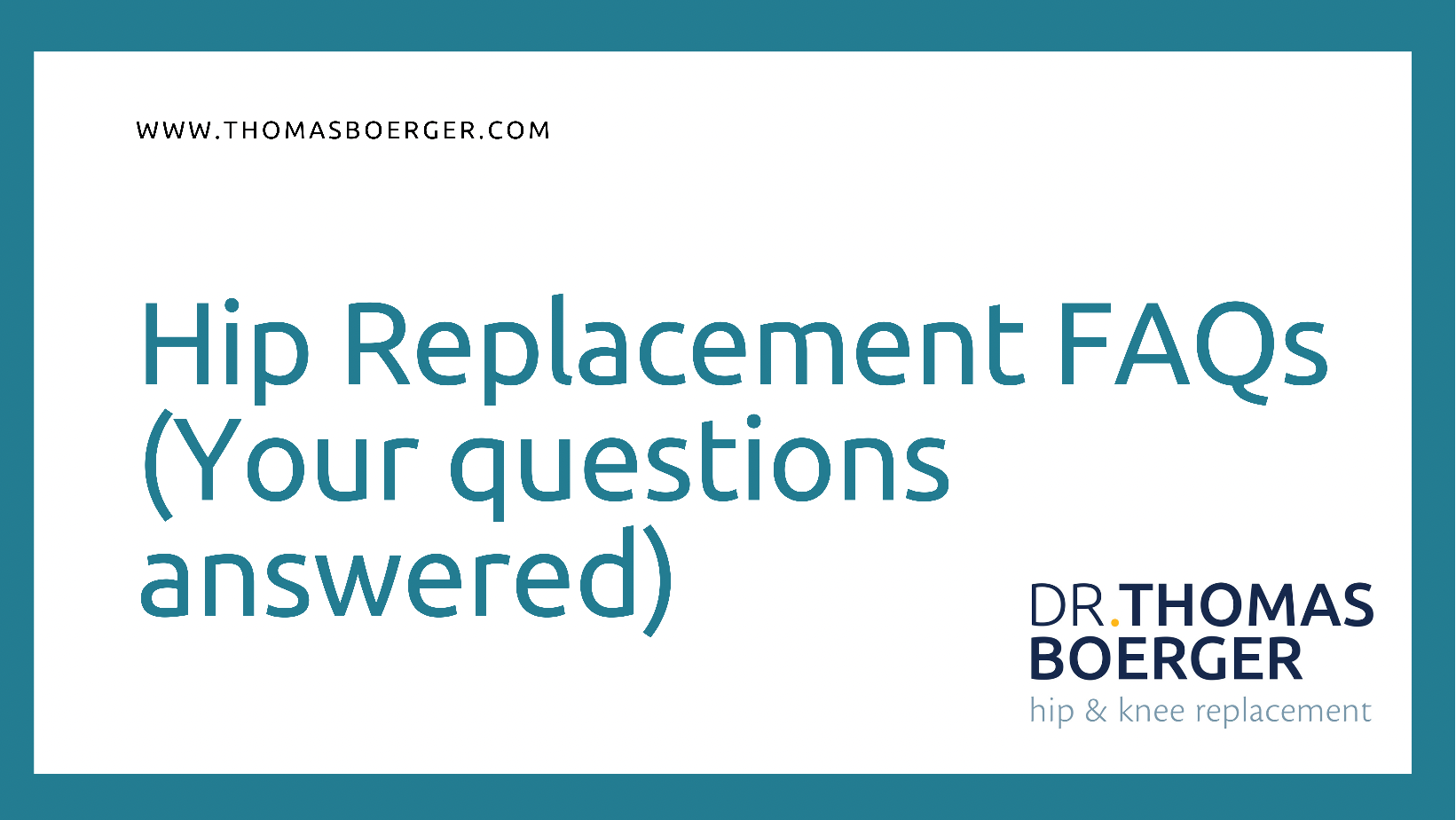
Dr. Thomas Boerger answers your questions about Hip Replacements.
Say goodbye to chronic hip pain with a hip replacement. I perform all my private practice Hip Replacement procedures in a world-class private hospital, using proven techniques and a sophisticated joint prothesis, personalised for you.
A Hip Replacement will replace the worn or damaged part of the joint with a new prosthetic personalised using computer-based templating. Hip Replacement is one of the world’s most successful medical interventions, with positive clinical outcomes. Satisfied patients regain their mobility and independence.
What is a Hip Replacement?
Patients with severe hip arthritis pain who are unable to walk can expect to return to pain-free mobility. Dr. Thomas Boerger performs more than 50 hip procedures a year. Dr. Boerger uses computer-based templating (TraumaCad) for every hip replacement and chooses the implant most suitable to the individual patient based on the templating. The aim is to recreate the pre-existing joint geometry as accurately as possible. Based on the bone quality, implants may be used with or without cement. Most patients receive an uncemented hip replacement.
.Assessment
All joint replacement patients undergo a pre-operative review with Dr. Boerger’s Nurse Assistant, Tanya Keble, and a review with a HC International Hospital anaesthetist. Basic investigations include screening blood tests and ECG. To minimize the risk of a peri-operative joint infection multiple skin and nose swabs are taken for MRSA and MSSA. Patients testing positive for skin colonisation are treated with body washes and ointment at home until repeated test results are negative.
If deemed necessary, a medical review will be scheduled. If cardiac problems are known or anticipated, a full cardiac work-up including stress test and heart catheterisation can be performed at HC International Hospital.
.Preparation
Before surgery, patients will meet a physiotherapist at HC International Hospital, and will be taught how to use crutches, transfer in and out of bed safely and perform basic daily tasks
.Surgery
Most Hip Replacement surgery is carried out under spinal anaesthetic with sedation. Dr. Boerger uses implants with validated long survival times and operative techniques that minimise risks and complications, including surgery performed in a laminar flow theatre and the use of astronaut-style helmets with all joint replacement surgery.
How long will I stay in Hospital?
A hip replacement usually requires 5 nights in hospital. Often patients are able to get up on the day of surgery.
The time in hospital is used for pain relief and physiotherapy. Some patients are able to be discharged earlier.
All our procedures are conducted in a luxury private hospital with private guest rooms.
From your initial consultation, a comprehensive, personalised treatment plan is created. In preparation for your recovery, we design specific multi-model, holistic pain-relief plan established for you to minimise post-operative discomfort, including spinal injections, pain-killer medication, and ice packs.
How long does Recovery & Rehabilitation take?
Within the public health service, it is common practice to propose accelerated rehabilitation protocols for Hip Replacements. Yet as a private patient you can be assured of the most comprehensive post-operative care including in-hospital physiotherapy before you leave.
Some patients request further in-house rehabilitation for another week or two. This can be arranged at HC International Hospital.
The majority of hip replacement patients will use one or two crutches for around 6 weeks. On average it takes 6 months for the hip replacement to ‘settle in’.
What Results and Aftercare can I expect?
Patient satisfaction for Hip Replacement is very high, typically offering a return to pain-free mobility.
Smokers must stop for 6 weeks before and after surgery in order to minimise the risks of post-operative complications such as cardio-respiratory problems, delayed wound healing, infection, and blood clot formation.
Most patients are maintained on anti-coagulation for 4 weeks after surgery.
Aftercare
Dr. Boerger personally follows up all his patients at 2 weeks, 6 weeks, 6 months and 1 year with new x-rays.
More Questions?
Feel free to contact me on WhatsApp, phone, or email. Details are on my website:
This article has been written by Dr Thomas O. Boerger, MD FRCSI (Tr&Orth) Consultant Orthopaedic Surgeon, who obtained his primary medical qualification from Berlin, Germany, and who is fully post-graduate Surgical and Orthopaedic sub-specialty trained and qualified in London, UK. Dr Boerger led in, and completed, Orthopaedic research projects, and successfully published with the Department of Biomechanical Engineering, Imperial College, London and University of Leeds, UK. He has also specific Arthroplasty (Hips and Knees) and Soft tissue/Ligamentous reconstruction fellowship experiences in Florence, Italy and Canberra and Sydney, Australia. Dr Boerger is currently operating in St Bernard’s Hospital, Gibraltar, and High Care International Hospital, Marbella, Costa del Sol, Spain.